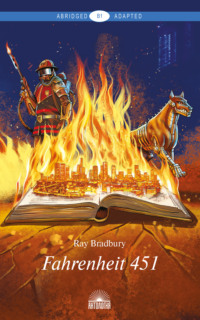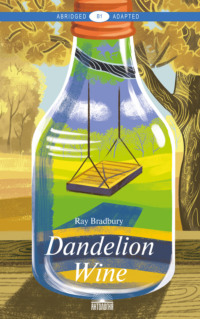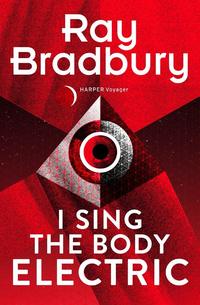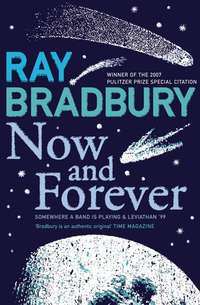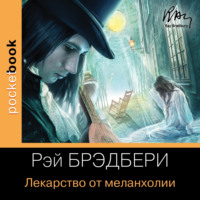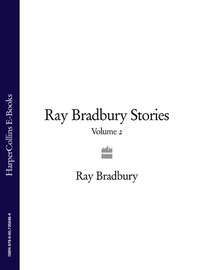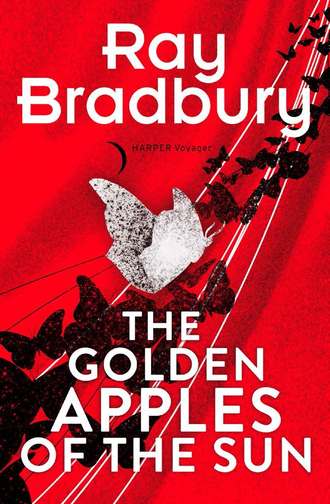
Полная версия
Golden Apples of the Sun
He went to a writing desk at which Huxley had been seated earlier. He opened a drawer and took out what he was looking for. A little magnifying glass Huxley sometimes used for reading. He took the magnifier and approached the wall uneasily.
Fingerprints.
“But those aren’t mine!” He laughed unsteadily. “I didn’t put them there! I’m sure I didn’t! A servant, a butler, or a maid perhaps!”
The wall was full of them.
“Look at this one here,” he said. “Long and tapered, a woman’s, I’d bet money on it.”
“Would you?”
“I would!”
“Are you certain?”
“Yes!”
“Positive?”
“Well—yes.”
“Absolutely?”
“Yes, damn it, yes!”
“Wipe it out, anyway, why don’t you?”
“There, by God!”
“Out damned spot, eh, Acton?”
“And this one, over here,” scoffed Acton. “That’s the print of a fat man.”
“Are you sure?”
“Don’t start that again!” he snapped, and rubbed it out. He pulled off a glove and held his hand up, trembling, in the glary light.
“Look at it, you idiot! See how the whorls go? See?”
“That proves nothing!”
“Oh, all right!” Raging, he swept the wall up and down, back and forth, with gloved hands, sweating, grunting, swearing, bending, rising, and getting redder of face.
He took off his coat, put it on a chair.
“Two o’clock,” he said, finishing the wall, glaring at the clock.
He walked over to the bowl and took out the wax fruit and polished the ones at the bottom and put them back, and polished the picture frame.
He gazed up at the chandelier.
His fingers twitched at his sides.
His mouth slipped open and the tongue moved along his lips and he looked at the chandelier and looked away and looked back at the chandelier and looked at Huxley’s body and then at the crystal chandelier with its long pearls of rainbow glass.
He got a chair and brought it over under the chandelier and put one foot up on it and took it down and threw the chair, violently, laughing, into a corner. Then he ran out of the room, leaving one wall as yet unwashed.
In the dining room he came to a table.
“I want to show you my Gregorian cutlery, Acton,” Huxley had said. Oh, that casual, that hypnotic voice!
“I haven’t time,” Acton said. “I’ve got to see Lily——”
“Nonsense, look at this silver, this exquisite craftsmanship.”
Acton paused over the table where the boxes of cutlery were laid out, hearing once more Huxley’s voice, remembering all the touchings and gesturings.
Now Acton wiped the forks and spoons and took down all the plaques and special ceramic dishes from the wall itself....
“Here’s a lovely bit of ceramics by Gertrude and Otto Natzler, Acton. Are you familiar with their work?”
“It is lovely.”
“Pick it up. Turn it over. See the fine thinness of the bowl, hand-thrown on a turntable, thin as eggshell, incredible. And the amazing volcanic glaze. Handle it, go ahead. I don’t mind.”
HANDLE IT. GO AHEAD. PICK IT UP!
Acton sobbed unevenly. He hurled the pottery against the wall. It shattered and spread, flaking wildly, upon the floor.
An instant later he was on his knees. Every piece, every shard of it, must be found. Fool, fool, fool! he cried to himself, shaking his head and shutting and opening his eyes and bending under the table. Find every piece, idiot, not one fragment of it must be left behind. Fool, fool! He gathered them. Are they all here? He looked at them on the table before him. He looked under the table again and under the chairs and the service bureaus, and found one more piece by match light and started to polish each little fragment as if it were a precious stone. He laid them all out neatly upon the shining polished table.
“A lovely bit of ceramics, Acton. Go ahead—handle it.”
He took out the linen and wiped it and wiped the chairs and tables and doorknobs and windowpanes and ledges and drapes and wiped the floor and found the kitchen, panting, breathing violently, and took off his vest and adjusted his gloves and wiped the glittering chromium.... “I want to show you my house, Acton,” said Huxley. “Come along.... ” And he wiped all the utensils and the silver faucets and the mixing bowls, for now he had forgotten what he had touched and what he had not. Huxley and he had lingered here, in the kitchen, Huxley prideful of its array, covering his nervousness at the presence of a potential killer, perhaps wanting to be near the knives if they were needed. They had idled, touched this, that, something else—there was no remembering what or how much or how many—and he finished the kitchen and came through the hall into the room where Huxley lay.
He cried out.
He had forgotten to wash the fourth wall of the room! And while he was gone the little spiders had popped from the fourth unwashed wall and swarmed over the already clean walls, dirtying them again! On the ceilings, from the chandelier, in the corners, on the floor, a million little whorled webs hung billowing at his scream! Tiny, tiny little webs, no bigger than, ironically, your—finger!
As he watched, the webs were woven over the picture frame, the fruit bowl, the body, the floor. Prints wielded the paper knife, pulled out drawers, touched the table top, touched, touched, touched everything everywhere.
He polished the floor wildly, wildly. He rolled the body over and cried on it while he washed it, and got up and walked over and polished the fruit at the bottom of the bowl. Then he put a chair under the chandelier and got up and polished each little hanging fire of it, shaking it like a crystal tambourine until it tilted bellwise in the air. Then he leaped off the chair and gripped the doorknobs and got up on other chairs and swabbed the walls higher and higher and ran to the kitchen and got a broom and wiped the webs down from the ceiling and polished the bottom fruit of the bowl and washed the body and doorknobs and silverware and found the hall banister and followed the banister upstairs.
Three o’clock! Everywhere, with a fierce, mechanical intensity, clocks ticked! There were twelve rooms downstairs and eight above. He figured the yards and yards of space and time needed. One hundred chairs, six sofas, twenty-seven tables, six radios. And under and on top and behind. He yanked furniture out away from walls and, sobbing, wiped them clean of years-old dust, and staggered and followed the banister up, up the stairs, handling, erasing, rubbing, polishing, because if he left one little print it would reproduce and make a million more!— and the job would have to be done all over again and now it was four o’clock!—and his arms ached and his eyes were swollen and staring and he moved sluggishly about, on strange legs, his head down, his arms moving, swabbing and rubbing, bedroom by bedroom, closet by closet....
They found him at six-thirty that morning.
In the attic.
The entire house was polished to a brilliance. Vases shone like glass stars. Chairs were burnished. Bronzes, brasses, and coppers were all aglint. Floors sparkled. Banisters gleamed.
Everything glittered. Everything shone, everything was bright!
They found him in the attic, polishing the old trunks and the old frames and the old chairs and the old carriages and toys and music boxes and vases and cutlery and rocking horses and dusty Civil War coins. He was half through the attic when the police officer walked up behind him with a gun.
“Done!”
On the way out of the house Acton polished the front doorknob with his handkerchief and slammed it in triumph!
The Flying Machine
In the year A.D. 400, the Emperor Yuan held his throne by the Great Wall of China, and the land was green with rain, readying itself toward the harvest, at peace, the people in his dominion neither too happy nor too sad.
Early on the morning of the first day of the first week of the second month of the new year, the Emperor Yuan was sipping tea and fanning himself against a warm breeze when a servant ran across the scarlet and blue garden tiles, calling, “Oh, Emperor, Emperor, a miracle!”
“Yes,” said the Emperor, “the air is sweet this morning.”
“No, no, a miracle!” said the servant, bowing quickly.
“And this tea is good in my mouth, surely that is a miracle.”
“No, no, Your Excellency.”
“Let me guess then—the sun has risen and a new day is upon us. Or the sea is blue. That now is the finest of all miracles.”
“Excellency, a man is flying!”
“What?” The Emperor stopped his fan.
“I saw him in the air, a man flying with wings. I heard a voice call out of the sky, and when I looked up, there he was, a dragon in the heavens with a man in its mouth, a dragon of paper and bamboo, colored like the sun and the grass.”
“It is early,” said the Emperor, “and you have just wakened from a dream.”
“It is early, but I have seen what I have seen! Come, and you will see it too.”
“Sit down with me here,” said the Emperor. “Drink some tea. It must be a strange thing, if it is true, to see a man fly. You must have time to think of it, even as I must have time to prepare myself for the sight.”
They drank tea.
“Please,” said the servant at last, “or he will be gone.”
The Emperor rose thoughtfully. “Now you may show me what you have seen.”
They walked into a garden across a meadow of grass, over a small bridge, through a grove of trees, and up a tiny hill.
“There!” said the servant.
The Emperor looked into the sky.
And in the sky, laughing so high that you could hardly hear him laugh, was a man; and the man was clothed in bright papers and reeds to make wings and a beautiful yellow tail, and he was soaring all about like the largest bird in a universe of birds, like a new dragon in a land of ancient dragons.
The man called down to them from high in the cool winds of morning. “I fly, I fly!”
The servant waved to him. “Yes, yes!”
The Emperor Yuan did not move. Instead he looked at the Great Wall of China now taking shape out of the farthest mist in the green hills, that splendid snake of stones which writhed with majesty across the entire land. That wonderful wall which had protected them for a timeless time from enemy hordes and preserved peace for years without number. He saw the town, nestled to itself by a river and a road and a hill, beginning to waken.
“Tell me,” he said to his servant, “has anyone else seen this flying man?”
“I am the only one, Excellency,” said the servant, smiling at the sky, waving.
The Emperor watched the heavens another minute and then said, “Call him down to me.”
“Ho, come down, come down! The Emperor wishes to see you!” called the servant, hands cupped to his shouting mouth.
The Emperor glanced in all directions while the flying man soared down the morning wind. He saw a farmer, early in his fields, watching the sky, and he noted where the farmer stood.
The flying man alit with a rustle of paper and a creak of bamboo reeds. He came proudly to the Emperor, clumsy in his rig, at last bowing before the old man.
“What have you done?” demanded the Emperor.
“I have flown in the sky, Your Excellency,” replied the man.
“What have you done?” said the Emperor again.
“I have just told you!” cried the flier.
“You have told me nothing at all.” The Emperor reached out a thin hand to touch the pretty paper and the bird-like keel of the apparatus. It smelled cool, of the wind.
“Is it not beautiful, Excellency?”
“Yes, too beautiful.”
“It is the only one in the world!” smiled the man. “And I am the inventor.”
“The only one in the world?”
“I swear it!”
“Who else knows of this?”
“No one. Not even my wife, who would think me mad with the sun. She thought I was making a kite. I rose in the night and walked to the cliffs far away. And when the morning breezes blew and the sun rose, I gathered my courage, Excellency, and leaped from the cliff. I flew! But my wife does not know of it.”
“Well for her, then,” said the Emperor. “Come along.”
They walked back to the great house. The sun was full in the sky now, and the smell of the grass was refreshing. The Emperor, the servant, and the flier paused within the huge garden.
The Emperor clapped his hands. “Ho, guards!”
The guards came running.
“Hold this man.”
The guards seized the flier.
“Call the executioner,” said the Emperor.
“What’s this!” cried the flier, bewildered. “What have I done?” He began to weep, so that the beautiful paper apparatus rustled.
“Here is the man who has made a certain machine,” said the Emperor, “and yet asks us what he has created. He does not know himself. It is only necessary that he created, without knowing why he has done so, or what this thing will do.”
The executioner came running with a sharp silver ax. He stood with his naked, large-muscled arms ready, his face covered with a serene white mask.
“One moment,” said the Emperor. He turned to a nearby table upon which sat a machine that he himself had created. The Emperor took a tiny golden key from his own neck. He fitted his key to the tiny, delicate machine and wound it up. Then he set the machine going.
The machine was a garden of metal and jewels. Set in motion, the birds sang in tiny metal trees, wolves walked through miniature forests, and tiny people ran in and out of sun and shadow, fanning themselves with miniature fans, listening to tiny emerald birds, and standing by impossibly small but tinkling fountains.
“Is it not beautiful?” said the Emperor. “If you asked me what I have done here, I could answer you well. I have made birds sing, I have made forests murmur, I have set people to walking in this woodland, enjoying the leaves and shadows and songs. That is what I have done.”
“But, oh, Emperor!” pleaded the flier, on his knees, the tears pouring down his face. “I have done a similar thing! I have found beauty. I have flown on the morning wind. I have looked down on all the sleeping houses and gardens. I have smelled the sea and even seen it, beyond the hills, from my high place. And I have soared like a bird; oh, I cannot say how beautiful it is up there, in the sky, with the wind about me, the wind blowing me here like a feather, here like a fan, the way the sky smells in the morning! And how free one feels! That is beautiful, Emperor, that is beautiful too!”
“Yes,” said the Emperor sadly, “I know it must be true. For I felt my heart move with you in the air and I wondered: What is it like? How does it feel? How do the distant pools look from so high? And how my houses and servants? Like ants? And how the distant towns not yet awake?”
“Then spare me!”
“But there are times,” said the Emperor, more sadly still,, “when one must lose a little beauty if one is to keep what little beauty one already has. I do not fear you, yourself, but I fear another man.”
“What man?”
“Some other man who, seeing you, will build a thing of bright papers and bamboo like this. But the other man will have an evil face and an evil heart, and the beauty will be gone. It is this man I fear.”
“Why? Why?”
“Who is to say that someday just such a man, in just such an apparatus of paper and reed, might not fly in the sky and drop huge stones upon the Great Wall of China?” said the Emperor.
No one moved or said a word.
“Off with his head,” said the Emperor.
The executioner whirled his silver ax.
“Burn the kite and the inventor’s body and bury their ashes together,” said the Emperor.
The servants retreated to obey.
The Emperor turned to his hand-servant, who had seen the man flying. “Hold your tongue. It was all a dream, a most sorrowful and beautiful dream. And that farmer in the distant field who also saw, tell him it would pay him to consider it only a vision. If ever the word passes around, you and the farmer die within the hour.”
“You are merciful, Emperor.”
“No, not merciful,” said the old man. Beyond the garden wall he saw the guards burning the beautiful machine of paper and reeds that smelled of the morning wind. He saw the dark smoke climb into the sky. “No, only very much bewildered and afraid.” he saw the guards digging a tiny pit wherein to bury the ashes. “What is the life of one man against those of a million others? I must take solace from that thought.”
He took the key from its chain about his neck and once more wound up the beautiful miniature garden. He stood looking out across the land at the Great Wall, the peaceful town, the green fields, the rivers and streams. He sighed. The tiny garden whirred its hidden and delicate machinery and set itself in motion; tiny people walked in forests, tiny faces loped through sun-speckled glades in beautiful shining pelts, and among the tiny trees flew little bits of high song and bright blue and yellow color, flying, flying, flying in that small sky.
“Oh,” said the Emperor, closing his eyes, “look at the birds, look at the birds!”
The Murderer
Music moved with him in the white halls. He passed an office door: “The Merry Widow Waltz.” Another door: “Afternoon of a Faun.” A third: “Kiss Me Again.” He turned into a cross corridor: “The Sword Dance” buried him in cymbals, drums, pots, pans, knives, forks, thunder, and tin lightning. All washed away as he hurried through an anteroom where a secretary sat nicely stunned by Beethoven’s Fifth. He moved himself before her eyes like a hand; she didn’t see him.
His wrist radio buzzed.
“Yes?”
“This is Lee, Dad. Don’t forget about my allowance.”
“Yes, son, yes. I’m busy.”
“Just didn’t want you to forget, Dad,” said the wrist radio. Tchaikovsky’s “Romeo and Juliet” swarmed about the voice and flushed into the long halls.
The psychiatrist moved in the beehive of offices, in the crosspollination of themes, Stravinsky mating with Bach, Haydn unsuccessfully repulsing Rachmaninoff, Schubert slain by Duke Ellington. He nodded to the humming secretaries and the whistling doctors fresh to their morning work. At his office he checked a few papers with his stenographer, who sang under her breath, then phoned the police captain upstairs. A few minutes later a red light blinked, a voice said from the ceiling:
“Prisoner delivered to Interview Chamber Nine.”
He unlocked the chamber door, stepped in, heard the door lock behind him.
“Go away,” said the prisoner, smiling.
The psychiatrist was shocked by that smile. A very sunny, pleasant warm thing, a thing that shed bright light upon the room. Dawn among the dark hills. High noon at midnight, that smile. The blue eyes sparkled serenely above that display of self-assured dentistry.
“I’m here to help you,” said the psychiatrist, frowning. Something was wrong with the room. He had hesitated the moment he entered. He glanced around. The prisoner laughed. “If you’re wondering why it’s so quiet in here, I just kicked the radio to death.”
Violent, thought the doctor.
The prisoner read this thought, smiled, put out a gentle hand. “No, only to machines that yak-yak-yak.”
Bits of the wall radio’s tubes and wires lay on the gray carpeting. Ignoring these, feeling that smile upon him like a heat lamp, the psychiatrist sat across from his patient in the unusual silence which was like the gathering of a storm.
“You’re Mr. Albert Brock, who calls himself The Murderer?”
Brock nodded pleasantly. “Before we start … ” He moved quietly and quickly to detach the wrist radio from the doctor’s arm. He tucked it in his teeth like a walnut, gritted and heard it crack, handed it back to the appalled psychiatrist as if he had done them both a favor. “That’s better.”
The psychiatrist stared at the ruined machine. “You’re running up quite a damage bill.”
“I don’t care,” smiled the patient. “As the old song goes: ‘Don’t Care What Happens to Me!’ ” He hummed it.
The psychiatrist said: “Shall we start?”
“Fine. The first victim, or one of the first, was my telephone. Murder most foul. I shoved it in the kitchen Insinkerator! Stopped the disposal unit in mid-swallow. Poor thing strangled to death. After that I shot the television set!”
The psychiatrist said, “Mmm.”
“Fired six shots right through the cathode. Made a beautiful tinkling crash, like a dropped chandelier.”
“Nice imagery.”
“Thanks, I always dreamt of being a writer.”
“Suppose you tell me when you first began to hate the telephone.”
“It frightened me as a child. Uncle of mine called it the Ghost Machine. Voices without bodies. Scared the living hell out of me. Later in life I was never comfortable. Seemed to me a phone was an impersonal instrument. If it felt like it, it let your personality go through its wires. If it didn’t want to, it just drained your personality away until what slipped through at the other end was some cold fish of a voice all steel, copper, plastic, no warmth, no reality. It’s easy to say the wrong thing on telephones; the telephone changes your meaning on you. First thing you know, you’ve made an enemy. Then, of course, the telephone’s such a convenient thing; it just sits there and demands you call someone who doesn’t want to be called. Friends were always calling, calling, calling me. Hell, I hadn’t any time of my own. When it wasn’t the telephone it was the television, the radio, the phonograph. When it wasn’t the television or radio or the phonograph it was motion pictures at the corner theater, motion pictures projected, with commercials on low-lying cumulus clouds. It doesn’t rain anymore, it rains soapsuds. When it wasn’t High-Fly Cloud advertisements, it was music by Mozzek in every restaurant; music and commercials on the busses I rode to work. When it wasn’t music, it was interoffice communications, and my horror chamber of a radio wristwatch on which my friends and my wife phoned every five minutes. What is there about such ‘conveniences’ that makes them so temptingly convenient? The average man thinks, Here I am, time on my hands, and there on my wrist is a wrist telephone, so why not just buzz old Joe up, eh? ‘Hello, hello!’ I love my friends, my wife, humanity, very much, but when one minute my wife calls to say, ‘Where are you now dear?’ and a friend calls and says, ‘Got the best off-color joke to tell you. Seems there was a guy——’ And a stranger calls and cries out, ‘This is the Find-Fax Poll. What gum are you chewing at this very instant!’ Well!”
“How did you feel during the week?”
“The fuse lit. On the edge of the cliff. That same afternoon I did what I did at the office.”
“Which was?”
“I poured a paper cup of water into the intercommunications system.”
The psychiatrist wrote on his pad.
“And the system shorted?”
“Beautifully! The Fourth of July on wheels! My God, stenographers ran around looking lost! What an uproar!”
“Felt better temporarily, eh?”
“Fine! Then I got the idea at noon of stomping my wrist radio on the sidewalk. A shrill voice was just yelling out of it at me, ‘This is People’s Poll Number Nine. What did you eat for lunch?’ when I kicked the Jesus out of the wrist radio!”
“Felt even better, eh?”
“It grew on me!” Brock rubbed his hands together. “Why didn’t I start a solitary revolution, deliver man from certain ‘conveniences’? ‘Convenient for whom?’ I cried. Convenient for friends: ‘Hey, Al, thought I’d call you from the locker room out here at Green Hills. Just made a sock-dolager hole in one! A hole in one, Al! A beautiful day. Having a shot of whiskey now. Thought you’d want to know, Al!’ Convenient for my office, so when I’m in the field with my radio car there’s no moment when I’m not in touch. In touch! There’s a slimy phrase. Touch, hell. Gripped! Pawed, rather. Mauled and massaged and pounded by FM voices. You can’t leave your car without checking in: ‘Have stopped to visit gas-station men’s room.’ ‘Okay, Brock, step on it!’ ‘Brock, what took you so long?’ ‘Sorry, sir.’ ‘Watch it next time, Brock.’ ‘Yes, sir!’ So, do you know what I did, Doctor? I bought a quart of French chocolate ice cream and spooned it into the car radio transmitter.”



